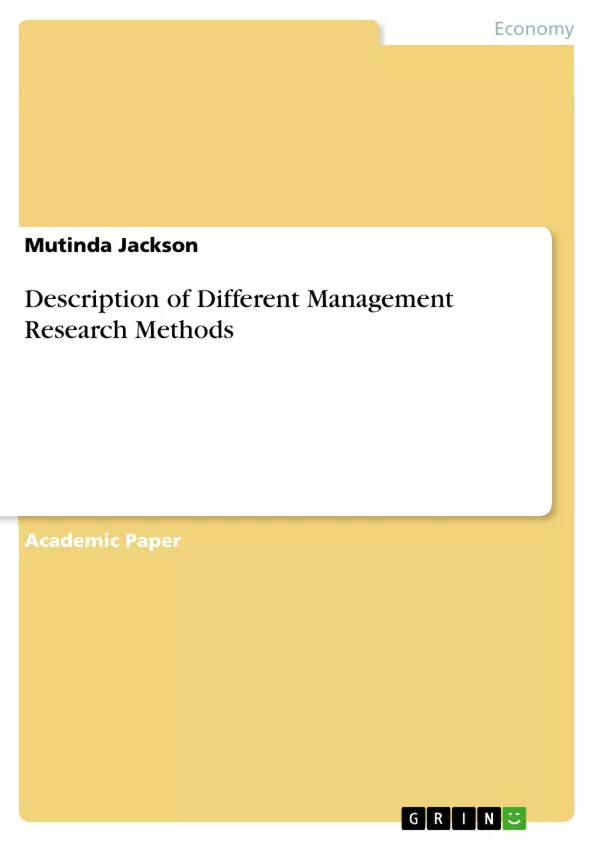Research has been noted to be one of the most motivating features of any course since it offers an individual the ability of measuring one’s control as well as autonomy over the acquired knowledge. In simple terms, research can be defined as an enquiry and exploratory process, which comprises of distinct features ranging from systematic, ethical and even methodical. Consequently, research has been observed to offer opportunities to corroborate, discover, pursue and even elucidate novel aspects of the topic or subject an individual is interested in. In addition, research helps in solving practical problems as well as increasing knowledge.
Inhaltsverzeichnis (Table of Contents)
- Research and Methodology
- Types of Research
- Research Approaches
- Research Methodologies
- Case Study Methodology
- Definition and Features
- Case Study Design
- Types of Case Studies
- Advantages of Case Study Methodology
- Data Examination within Context
- Qualitative and Quantitative Data Analysis
- Elucidation of Real-Life Circumstances
- Disadvantages of Case Study Methodology
- Lack of Rigour
- Limited Generalizability
- Time-Consuming and Data-Intensive
- Ethical Considerations in Case Study Methodology
Zielsetzung und Themenschwerpunkte (Objectives and Key Themes)
This paper aims to provide a comprehensive overview of case study methodology as a research approach. The paper examines the definition, features, design, and different types of case studies. It explores the advantages and disadvantages of this methodology and delves into ethical considerations associated with its implementation.
- Definition and characteristics of case study methodology
- Design and types of case studies
- Advantages and disadvantages of case study methodology
- Ethical considerations in case study research
- Applications of case study methodology in various research fields
Zusammenfassung der Kapitel (Chapter Summaries)
- Research and Methodology: This section introduces the concept of research and its diverse types, including explanatory, descriptive, analytical, and predictive research. The paper discusses different research approaches such as quantitative/qualitative, applied/basic, and deductive/inductive. It also explains the role of research philosophy in influencing methodology.
- Case Study Methodology: This section delves into the definition and features of case study methodology, highlighting its focus on in-depth exploration of a specific phenomenon within its context. The paper then explores the design of case studies, including single-case and multiple-case designs, and examines the different types of case studies, such as exploratory, descriptive, and explanatory.
- Advantages of Case Study Methodology: This section highlights the strengths of case study methodology, emphasizing its ability to examine data within its context, integrate qualitative and quantitative data analysis, and provide nuanced understanding of real-life situations. The paper illustrates these advantages with relevant examples.
- Disadvantages of Case Study Methodology: This section discusses the limitations of case study methodology, including critiques regarding its lack of rigour, limited generalizability, and time-consuming nature. The paper explores the challenges posed by the data-intensive nature of case studies and the potential for misleading results if data is not managed effectively.
Schlüsselwörter (Keywords)
The key terms and concepts explored in this paper include case study methodology, research methodology, qualitative research, quantitative research, data analysis, research design, ethical considerations, advantages, disadvantages, and applications.
Frequently Asked Questions
How is "research" defined in this paper?
Research is defined as a systematic, ethical, and methodical enquiry and exploratory process to increase knowledge.
What are the main types of management research?
The paper discusses explanatory, descriptive, analytical, and predictive research types.
What is the "Case Study Methodology"?
It is a research approach focused on the in-depth exploration of a specific phenomenon within its real-life context.
What are the advantages of using case studies?
They allow for data examination within context and the integration of both qualitative and quantitative data analysis.
What are the common criticisms of case study research?
Common disadvantages include a perceived lack of rigour, limited generalizability of results, and being time-consuming.
- Citar trabajo
- Business Administrator Mutinda Jackson (Autor), 2018, Description of Different Management Research Methods, Múnich, GRIN Verlag, https://www.grin.com/document/429527



